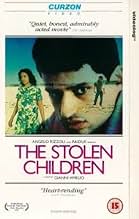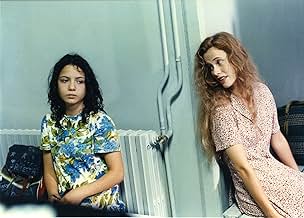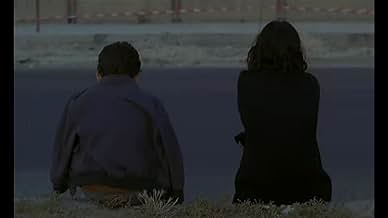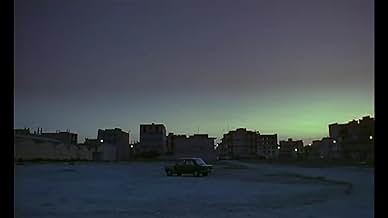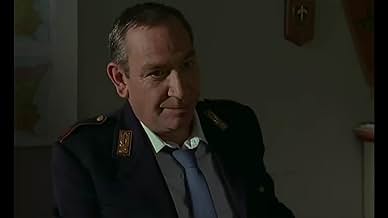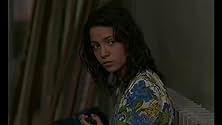Antonio, recibe la orden de llevar a dos niños de Milán a Sicilia, a un orfanato. Su madre ha sido detenida por obligar a Rosetta a trabajar como prostituta.Antonio, recibe la orden de llevar a dos niños de Milán a Sicilia, a un orfanato. Su madre ha sido detenida por obligar a Rosetta a trabajar como prostituta.Antonio, recibe la orden de llevar a dos niños de Milán a Sicilia, a un orfanato. Su madre ha sido detenida por obligar a Rosetta a trabajar como prostituta.
- Dirección
- Guionistas
- Elenco
- Premios
- 18 premios ganados y 14 nominaciones en total
Opiniones destacadas
This is one of the best films of all time. The story is heartbreaking: an 11 year-old girl has been forced into prostitution by her mother. When the police arrest the mother, Rosetta and her little brother Luciano (who is 9) must be taken to a children's home in the south of Italy. A young Carabiniere named Antonio is assigned the task of taking them from Milan to Sicilly, even though he's barely more than a child himself. The journey takes this mismatched threesome to Antonio's home province, where he re-unites briefly with his sister and his old granny, before Rosetta is recognized from a magazine cover, and shunned. The growing tenderness among the three young people is the essence of the story. The girl, although only 11, conveys the bitterness of adulthood through her ineffably sad eyes. She knows so much more about life than her 19 year-old policeman, yet without any seedy sexual implications, he comes to teach her through his tender care that there's more to life than sorrow. Luciano is a beautiful child, whose adoration of the soldier/cop is delicately and warmly depicted. Only The 400 Blows and Forbidden Games have captured the ache of childhood as well. The director has used stunning compositions and lingering takes of the Italian countryside that make the story resonate beyond its intimate canvas. The acting is brilliant. I suppose the only reason this film has not been released on DVD is it's controversial subject matter, which is a shame, because that shunning is what the film is about. The Italian title is Il Ladro di Bambini. Don't miss it!
This movie is the story of a journey, a common theme among movie-makers. In this film a policeman is charged with the transfer of two children (aged 11 and 9)from Milano to a Home for Children in Sicily. It is based on a newspaper report which gives authenticity to the story. Remarkable performances are given by the children who amazingly have had no previous experience in film-acting. Eye contact between the main characters is particularly powerful. The policeman also acts convincingly. He finds the resentful children a difficult pair to control. The 11-year old has a secret(about her life of prostitution) and her young brother is an asthmatic sadly in need of his father who has abandoned them. There are some tender scenes in the film where the policeman introduces the children to his happy extended family, where the policeman gives the boy some swimming lessons in the sea and where they agree to find each other when the boy leaves the Home at 15 years of age. A simple theme but so enthralling.
This marvelous film deals with a topic, exploitation of children (euphimism), that is difficult on viewers. All over the world bad things are happening to young people who can not control their own lives because they are children. The innocents tainted in this world will become saints and dwell in Heaven with Our Father. No, this film isn't about religion per se. But it is about the struggle and the triumph of humans over their sometimes miserable, but always radiant, terrible difficulties. The adult who has to deal with the two abandoned children is marvelously played and his growth as a human being in the sense of doing the right thing, rather than just "following orders" is a great performance. The leading character is an 11-12 year old girl who I understand was not an actress before performing in this film. I could open a floodgate of positive adjectives and remarks about her performance, but let's just say that she play her role so authentically and underplays, which is necessary, the plight of her character, where the underplaying is simply the character being herself in a world she endures,and must accept, but is one no one would choose. I hope that viewers will remember (and if they don't, watch the movie again) the final scene where she tries to give her brother hope and show the viewer that even the worst world can be inhabited and experienced with at least some joy--sometimes only a tiny measure of happiness is all we can get in our lives, but still we must savor it.
Many people complain that so and so movie is not on DVD etc., but this film was released on VHS for a short time in the early 90's and only a few copies are on the market at a fairly high price--the film should be transferred to DVD by Criterion or someone (I wish I knew how). Buy the VHS and watch a movie that points the way, as almost no movie really does, to the real, complex, harmful, and sometimes wonderful world that exists beyond the movie.
Many people complain that so and so movie is not on DVD etc., but this film was released on VHS for a short time in the early 90's and only a few copies are on the market at a fairly high price--the film should be transferred to DVD by Criterion or someone (I wish I knew how). Buy the VHS and watch a movie that points the way, as almost no movie really does, to the real, complex, harmful, and sometimes wonderful world that exists beyond the movie.
The story of a young carabiniere that has been assigned the job to escort a couple of minors from Milan to their native Sicily. Stops along the way include the riviera (around Genova or Livorno), Rome, Calabria. Travel is done by train and by car. We see segments of italy in their socio-economic regional realities. The folks in Calabria are seen living next to a busy road in a house with no stucco covering the bare bricks, a common tactic used in the south to qualify for a taxation exemption (being the house not completed). Smartly filmed, it candidly reveals an Italy closer to what natives struggling to make a living would experience in having to travel along the length of the Italian booth. This is a fictional movie, but there is an effort to make evident how realistically people live today.
'Il Ladro Di Bambini' is one of the most moving pieces of cinema I've ever seen, and it reminds me so clearly why I love film. I've just seen it, and I'm still very emotional over what I saw. The children play the roles perfectly, and Enrico Lo Verso's performance is brilliant as well. It's such a simple film actually, but so incredibly powerful. The scene where Luciano tells Antonio that he'll come looking for him as soon as he's turned 15, no matter where he is, made me cry. This is a true, honest film about trust, that I will treasure for a long time to come.
¿Sabías que…?
- TriviaEnrico Lo Verso was the only member of the main cast to be a professional actor.
- ConexionesEdited into Lo schermo a tre punte (1995)
- Bandas sonorasDomenica bestiale
Written and performed by Fabio Concato
Courtesy of Warner Chappell - PolyGram Italia
Selecciones populares
Inicia sesión para calificar y agrega a la lista de videos para obtener recomendaciones personalizadas
- How long is The Stolen Children?Con tecnología de Alexa
Detalles
Taquilla
- Total en EE. UU. y Canadá
- USD 931,280
- Fin de semana de estreno en EE. UU. y Canadá
- USD 17,524
- 7 mar 1993
- Total a nivel mundial
- USD 931,280
- Tiempo de ejecución1 hora 54 minutos
- Color
- Relación de aspecto
- 1.85 : 1
Contribuir a esta página
Sugiere una edición o agrega el contenido que falta

Principales brechas de datos
What is the English language plot outline for Il ladro di bambini (1992)?
Responda
